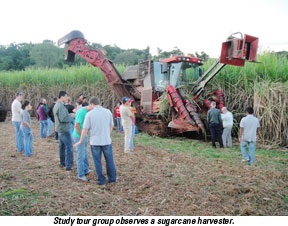 Eighteen Iowa State and University of Kentucky students recently returned from two weeks in Brazil, where they got a firsthand look at coffee farms and sugarcane production.
Eighteen Iowa State and University of Kentucky students recently returned from two weeks in Brazil, where they got a firsthand look at coffee farms and sugarcane production.
Brian Steward, Iowa State associate professor in agricultural and biosystems engineering, and Scott Shearer, chair of biological and agricultural engineering at the University of Kentucky, led the tour. The group visited the southeast region of Brazil, including the states of Minas Gerais, São Paulo, and Rio de Janeiro. The study tour focused on the development, adoption, and use of engineering technology in agricultural and bioenergy production as well as the effect of scale (size of agricultural operation) on technology adoption.
The students learned about coffee production through visits to two coffee farms. One had about 20 hectares (50 acres) of coffee production and harvested the coffee by hand.
“Observing coffee harvested by hand was an eye-opening experience,” says Kevin Muell, an Iowa State senior in industrial technology. “When we tried to do it ourselves, it really hit home how hard of a job it is.”
The other farm is the world’s largest coffee farm with 5,000 hectares (12,355 acres) of coffee production. It is a vertically integrated business, meaning the farm’s operators control everything from production of the raw material through export.
A visit to the Cosan sugarcane facility in Piracicaba gave the students insight into the production, harvesting, and processing of sugarcane. Using the sugarcane from 50,000 hectares (123,355 acres) of land each year, the plant produces sugar, ethanol, and electricity. Brazil is undergoing a transition from manual to mechanical harvesting, according to Steward. Currently about half of the cane is manually harvested, which first requires the fields to be burned. By 2014, it is expected that 100% of fields with less than a 12% degree slope will be mechanically harvested.
The study tour also included a visit to the campus of the Federal University of Vicosa (UFV), Minas Gerais. UFV is the leading agricultural university in Brazil and was founded by Iowa State alum Peter Henry Rolfs (BS1889, MS1891) in 1921. Iowa State and UFV are members of a U.S. Department of Education FIPSE-sponsored consortium facilitating the exchange of students and faculty members.
Overall, the study tour was an amazing experience, according to Muell. “I feel that I gained a great amount of respect for foreign countries,” he says. “Seeing some of the living conditions and situations they have to deal with made me grateful for what I have.”
Kelsey Regan, biological systems engineering freshman from Davenport, adds, “I was able to see how agriculture in Brazil is different than agriculture in Iowa. In Brazil they are able to produce a larger variety of crops but much of the harvesting is still done by hand. Also, it was great to learn about Brazilian culture. Even though it is still a developing country, I noticed many ways that Brazil is similar to the United States. Participating in this study abroad has made me consider returning to Brazil for a semester.”